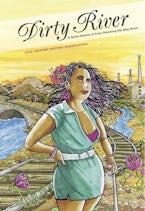"Dirty River is a candid and comic view from the tattooed underbelly of contemporary life. There is no syrup in this survivor's tale, yet the sun does shine through these shadows, making you cheer for the hero(ine) in her odyssey to know her true self." —Jewelle Gomez, author of The Gilda Stories
"Dirty River will give you back the life you stole and saved: your own. In the tradition of June Jordan's Soldier, Audre Lorde's Zami, Asha Bandele's Something Like Beautiful, and Staceyann Chin's The Other Side of Paradise, Dirty River is a memoir that will make you itch all over while you read it and emerge having shed another layer of internalized doubt. You are brave enough to face this honest, transformative work, because you are brave enough to be who you are." —Alexis Pauline Gumbs, co-editor of Revolutionary Mothering
"Leah Lakshmi Piepzna-Samarasinha's newest book is the powerful, badass, and important story of a young queer femme of color's coming of age on her own terms. Intersectional and glittering and raw, this book has bite—it's a kind of primal yell for all us survivors of abuse, as we pull together and howl and love and live." —Randa Jarrar, author of A Map of Home
"Dirty River goes above and beyond being a story of survival; it is a manifesto for those of us who have also been walking, scantily clad, down dark alleys for most of our lives." —Lambda Literary
"Dirty River is a biracial-abuse-survivor-queer-femme-working-class-immigrant-anarchist-punk bomb that explodes the myth of LGBT sameness." —The Globe and Mail
"If you've been looking for more stories about badass queer women of color, get this book yesterday. Leah Lakshmi Piepzna-Samarasinha tells the tale of running away to Canada with what she could stuff into two backpacks and discovering queer anarchopunk while grappling with her past. She's relatable, funny, and brave; we need more of these stories." —Book Riot
"A brilliant book ... Piepzna-Samarasinha challenges traditional narratives around gender, domesticity, and motherhood with a more specific focus on her journey to separate from her abusive mother and give birth to herself as a mixed brown, working class, disabled femme." —Bitch Media
"In this transformative memoir, Piepzna-Samarasinha details being a queer, disabled woman of color coming of age among young queer punks in Toronto, running from the abuse of her past. This tragicomic tale is filled with what activists now call intersectionality, but in terms of literature, it’s raw and passionate and wrenching -- and it belongs on shelves next to Audre Lorde's Zami or the pioneering This Bridge Called My Back." —The Advocate
"Dirty River is a candid and comic view from the tattooed underbelly of contemporary life. There is no syrup in this survivor's tale, yet the sun does shine through these shadows, making you cheer for the hero(ine) in her odyssey to know her true self." —Jewelle Gomez, author of The Gilda Stories
"Dirty River will give you back the life you stole and saved: your own. In the tradition of June Jordan's Soldier, Audre Lorde's Zami, Asha Bandele's Something Like Beautiful, and Staceyann Chin's The Other Side of Paradise, Dirty River is a memoir that will make you itch all over while you read it and emerge having shed another layer of internalized doubt. You are brave enough to face this honest, transformative work, because you are brave enough to be who you are." —Alexis Pauline Gumbs, co-editor of Revolutionary Mothering
"Leah Lakshmi Piepzna-Samarasinha's newest book is the powerful, badass, and important story of a young queer femme of color's coming of age on her own terms. Intersectional and glittering and raw, this book has bite—it's a kind of primal yell for all us survivors of abuse, as we pull together and howl and love and live." —Randa Jarrar, author of A Map of Home
"Dirty River goes above and beyond being a story of survival; it is a manifesto for those of us who have also been walking, scantily clad, down dark alleys for most of our lives." —Lambda Literary
"Dirty River is a biracial-abuse-survivor-queer-femme-working-class-immigrant-anarchist-punk bomb that explodes the myth of LGBT sameness." —The Globe and Mail
"If you've been looking for more stories about badass queer women of color, get this book yesterday. Leah Lakshmi Piepzna-Samarasinha tells the tale of running away to Canada with what she could stuff into two backpacks and discovering queer anarchopunk while grappling with her past. She's relatable, funny, and brave; we need more of these stories." —Book Riot
"A brilliant book ... Piepzna-Samarasinha challenges traditional narratives around gender, domesticity, and motherhood with a more specific focus on her journey to separate from her abusive mother and give birth to herself as a mixed brown, working class, disabled femme." —Bitch Media
"In this transformative memoir, Piepzna-Samarasinha details being a queer, disabled woman of color coming of age among young queer punks in Toronto, running from the abuse of her past. This tragicomic tale is filled with what activists now call intersectionality, but in terms of literature, it’s raw and passionate and wrenching -- and it belongs on shelves next to Audre Lorde's Zami or the pioneering This Bridge Called My Back." —The Advocate

